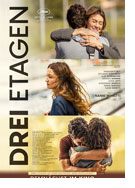

Opening 17 Mar 2022
Directed by:
Nanni Moretti
Writing credits:
Eshkol Nevo, Nanni Moretti, Federica Pontremoli, Valia Santella
Principal actors:
Riccardo Scamarcio, Margherita Buy, Alba Rohrwacher, Adriano Giannini, Elena Lietti
Italian director Nanni Moretti (Mia Madre, 2015, The Son's Room, 2001) co-wrote the screenplay with Federica Pontremoli and Valia Santella based on Israeli author Eshkol Nevo’s 2015 novel, Shalosh Qonmot (Three Floors Up). Moretti working from an adaptation is surprising, and perhaps that is where his usual narrative freshness gets lost in the translation.
The action crashes onscreen as drunken driver Andrea (Alessandro Sperdute), the aberrant son of judges, careens around a corner killing a woman which the pregnant Monica (Alba Rohrwacher) sees leaving a grand apartment building in an affluent Rome (instead of Tel Aviv) neighborhood. Nevertheless, Monica takes herself to a hospital, gives birth, and returns home before informing husband Giorgio (Adriano Giannini), regularly away because of work. Post-natal depression, lack of companionship, and a recurring illusion has her tottering on sanity’s edge. Whereas professionals Lucio (Riccardo Scamarcio) and Sara (Elena Lietti) pack so much in their days, good-hearted Giovanna (Anna Bonaiuto) and Renato (Paolo Graziosi) next door frequently mind Francesca (Chiara Abalsamo at 7, Gea Dall’Orto at 17). One fateful evening Lucio, conveniently overlooking Renato’s memory impairment, asks his help babysitting Francesca, and then they go missing. Lucio finds them disorganized and traumatized in nearby woods. Lucio immediately, and sans validation, thinks the worst about Renato, thus provoking a decades-long feud. Nevertheless, he has no qualms about intimately responding to their teenage granddaughter Charlotte’s (Denise Tantucci) overt flirtations. And finally, the judges, phlegmatic Vittorio (Moretti) and lenient Dora (Margherita Buy) are beside themselves with their troublemaking son. Except, this time one decides to stand on the side of decency regarding Andrea’s conviction.
The film plows from one unhappy event, occurrence, affair, circumstance, and/or experience to another with a certain feel of manipulated melodrama and sentimentality. Stretching over three time-periods, Drei Etagen lacks insight, depth, and humor. Some scenes defy credibility, e.g., Charlotte enticing Lucio, others clarity, e.g., Monica’s crow, while others compassion, e.g., the Renato situation. The cast brings little expression to one-dimensional characters that never develop, change, or talk about anything important, i.e., current events. Although. the uplifting, grace-saving film score by Franco Piersanti’s boosts the overall mood. Three Floors Up may have premiered at 2021 Cannes Film Festival, yet contraire to its print inspiration it is a forgettable film. (Marinell Haegelin)